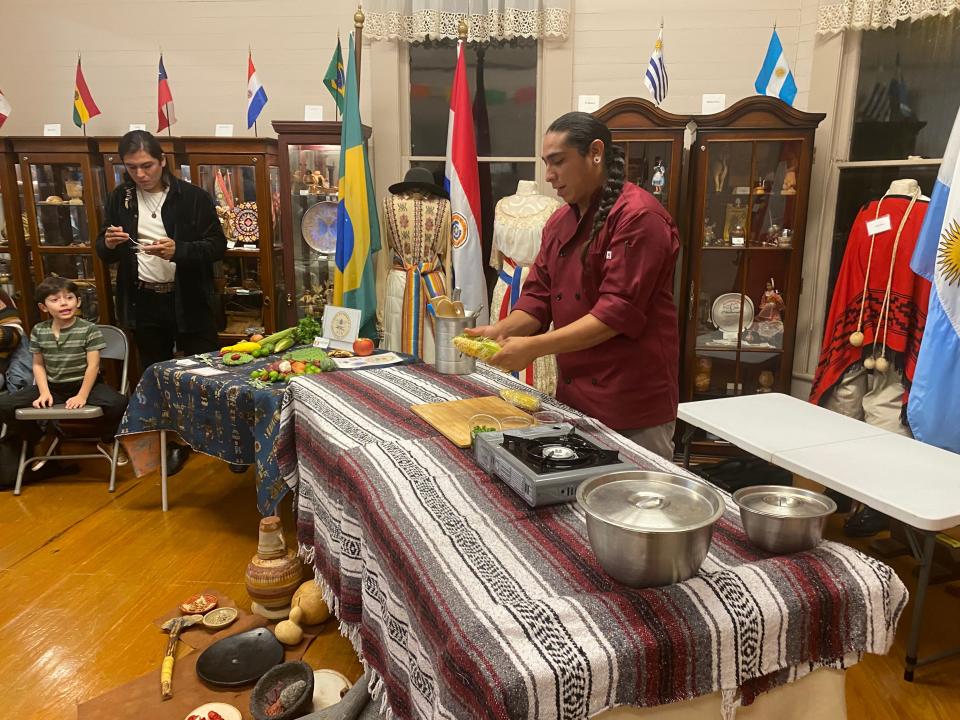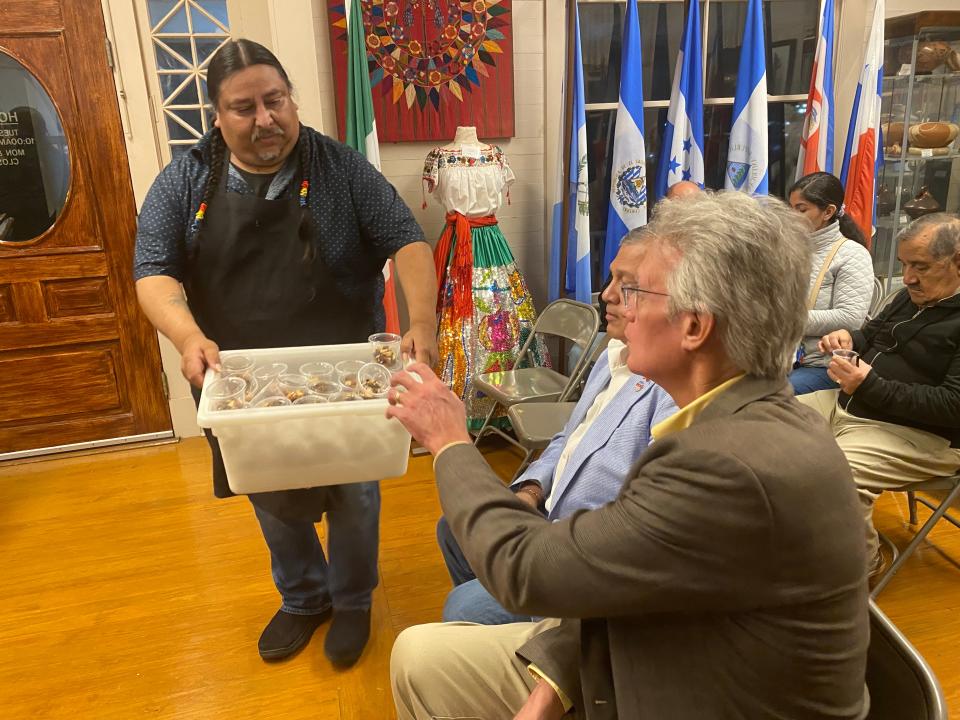Indigenous foods celebrated and shared at "Thanksgiving Decolonized" event
Corn, squash and bean soup, bison served with wild rice, nopal salad and cookies made from mesquite and almond flour — these are some of the dishes Four Elements Indigenous Cuisine served at a de-colonized Thanksgiving gathering Saturday evening.
Hosted by the Instituto de Cultura Hispánica de Corpus Christi, local caterers Isaac EagleBear Alvarado and Meagan Alvarado prepared a pre-colonial-inspired meal, including a live cooking demonstration. Isaac EagleBear Alvarado showed attendees how to prepare the dishes, while other members of the family, including his wife, Meagan Alvarado, and his father, Tomahawk Alvarado, served the food.
The event was held in the institute's museum showcasing Hispanic culture.
"The Institute of Hispanic Culture, our mission is to promote and preserve Hispanic culture and this is part of it," Arturo Lima, who helped plan the event, said. "You cannot have Hispanic culture without Indigenous people."
Many people of Latin American descent have both European and Indigenous American heritage.
Lima said the institute is interested in "decolonizing", or "re-Indigenizing", Hispanic heritage and plans to hold more events with an Indigenous focus in the future.

The Alvarados began their family business in 2021, with a focus on locally grown and sourced Indigenous food, but the roots of the effort date much further. Growing up, Isaac EagleBear Alvarado's grandmother and other relatives prepared traditional dishes, growing ingredients in their gardens.
"From frijoles, beans, to nopales, the cactus, mixed with eggs and potatoes, the familiar things that we eat have a deeper origin," he said. "Even as a kid, I loved the culinary arts and that expanded — I wanted to know the origins of the food and where it came from."
The family has mixed heritage, including Mexica and Lipan Apache. The Alvarados are passionate about connecting with their heritage and sharing traditions with the community.
"My passion was for cooking my entire life and that's how EagleBear was introduced to cooking and he helped me in kitchens everywhere I went and we worked together in jobs and next thing you know, he's taking it off and he's taken it further than I have," Tomahawk Alvarado said.
The dishes are based on family recipes and Isaac EagleBear Alvarado's research on native ingredients and traditional pre-colonial cooking techniques.
He shared words from Nahautl, such as elotl nohpalli succottash, for a vegetable dish featuring nopal cactus and corn, and Lipan Apache. The dishes specifically featured foods native to Texas, though at times Alvarado added ingredients from other parts of North America.

Bison meat, provided by the Texas Tribal Buffalo Project, was served with wild rice. Though Indigenous Texans would have harvested zizania texana in the San Marcos River, today the wild rice is endangered. Because of this, the Alvarados substituted with a different species of wild rice native to Minnesota.
"We can still replicate our ancestral, traditional ways of eating in our diet and incorporate it into our daily lives," Isaac EagleBear Alvarado said.
He also touted the health benefits of eating fresh, locally-sourced foods.
"We're seeking to promote healthy eating through fresh produce and the connection to Mother Earth," Alvarado said. "With these teachings, it's not only just cooking. It's also how to reconnect and understand that these foods are more than just foods, they're medicines."
Four Elements will be a vendor at the Art Museum of South Texas's Third Thursday event this week, as well as at the Turtle Bay Powwow planned for Dec. 2 at Texas A&M University-Corpus Christi.
A&M-Corpus Christi event focuses on Karankawas past and present
Events planned in Corpus Christi for Native American Heritage Month 2023
This article originally appeared on Corpus Christi Caller Times: Institute de Cultura Hispánica Thanksgiving highlights native foods

